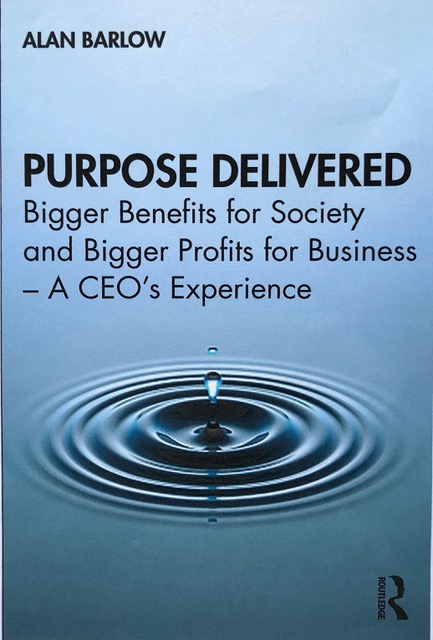Integrity in business: What can the private sector learn from non-profits?
This guest blog by Integrity Action's Trustee Alan Barlow covers the link between the organisation's model on integrity and its application to the business world.
"Western capitalism is in crisis due to the growing disconnect between business and society, and there are growing calls for a shift from the primacy of shareholder value to the primacy of purpose. But there is a paucity of codified best practice for how CEOs should go about making this shift...".
These are the opening words of my book: "PURPOSE DELIVERED: Bigger Benefits for Society & Bigger Profits for Business - A CEO's Experience" (Routledge, 2021).
You may ask, what has this got to do with Integrity Action? Let me explain.
My Heightened Integrity Business Model on how to deliver a company's purpose draws directly from Integrity Action’s framework on 'closing the feedback loop'.
Integrity Action works to support citizens to monitor the delivery of vital projects and services where they live and to solve the problems they find. It facilitates this by use of the technology tool and mobile app DevelopmentCheck. This is inspired by the rise of open feedback in the commercial sector, which sees consumers posting their feedback publicly, in real time. This closing of the feedback loop means their feedback cannot be ignored.
Conventionally, trustees draw on their expertise to add value to their charities' activities. In this case, Integrity Action is a source of proven best practice and contributed to my expertise. I draw on it in defining my Heightened Integrity Business Model, which sets out how CEOs can deliver a purpose-defined company that yields both bigger benefits for society and bigger profits for business.
Heightened integrity is at the hub of the model as the modus operandi for how CEOs should lead and operate their company to deliver its defined purpose. The model consists of six interdependent processes:
- Purpose statement: Be big, bold, ambitious, authentic, inspirational and practical.
- Stakeholders: Identify and value the specific connection that matters, its people.
- Integrity/compliance: Embody an integrity and compliance ethos in the business.
- Leadership: Ensure leadership's moral compass is seen to demonstrate the right tone from the top.
- Staff: Deliver radical staff engagement and communication.
- Feedback: Proactively close the feedback loop between leaders and the company's people.
In the book, I demonstrate this model by application to a multinational corporation, for which where I was its CEO. It is then successfully benchmarked against sets of third-party best practice of what is expected from a purpose-defined company. Consequently, the Heightened Integrity Business Model has wider applicability beyond a single case study company. The book provides a fully documented road map for monitoring and reviewing successful impact, and highly focused non-financial and financial metrics for benchmarking. The model benefits from analytical rigour and being founded on evidence-based argumentation.
Consequently, business becomes a force for good for society. Inefficient markets become more efficient.
I have received some kind comments on the book, including from Lord Jim O'Neill, Chairman of Chatham House and formerly, Chairman Goldman Sachs Asset Management, Commercial Secretary to the UK Treasury, who said "... a most important book ... articulates how capitalism can rediscover its legitimacy ... written, in Alan’s case, by someone who was walked the walk and not just talked the talk."
And Charles Wookey, CEO of Blueprint for Better Business noted that “... this timely and insightful book ... provides a powerful worked example that shows the steps a committed and visionary CEO took to put purpose into practice in a challenging context."
But I am always happy to hear what others think about reconciling purpose and profit. If you’d like to share your thoughts, please reach out via info@integrityaction.org. We are also keen to hear your thoughts on social media! Tweet us @Act4Integrity
Nominated: Financial Times and McKinsey Business Book Awards, 2021.

Alan Barlow. Formerly: CEO, multinational chemical engineering group; Director, FTSE 100/NYSE listed energy group; and, Partner, PricewaterhouseCoopers. Doctorate in Economics, Oxford University. Trustee, Integrity Action.
Header photo by Terry Vlisidis on Unsplash


